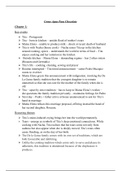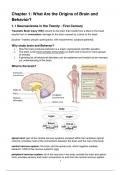Thomas Aquinas takes on a theological approach and argues that guilt is the consequence of
humans using their reason ineptly and pursuing evil, going against our synderesis. Whereas,
Freud takes on a psychological approach to the conscience and argues that guilt is the result of
the conflicting desires of the id, ego and superego. Through critical analysis, it will become clear
that Aquinas's concept of guilt is superior to that of Freuds because it holds us accountable for
our actions and it can explain our society.
Aquinas' concept of guilt is superior to that of Freuds because we are able to progress and
improve ourselves as a result of it. Aquinas argues that we have a responsibility to develop
phronesis and prudence through repeated use of reason in order to avoid making moral errors.
When one makes a moral error this is either because of vincible ignorance (a lack of knowledge
for which a person is responsible) or invincible ignorance (a lack of knowledge for which a
person is not responsible). For example – a man sleeping with another woman because he is
unaware of the rule against adultery is responsible, as he has failed to develop the right reason.
A man who sleeps with a woman who he believes to be his wife, knowing adultery is wrong, is
not responsible as his error was not due to a lack of prudence. When we experience vincible
ignorance we feel guilt because we have failed to develop our reason. This guilt is good and
productive because it allows us to seek improvement and motivates us to improve our reason.
By improving our ratio through education via the Bible and by adhering to the primary precepts
for example of living within an ordered society and education we can improve ourselves and
make ourselves better. In contrast, Freud's psychological explanations seem to suggest our
conscience is merely a product of our surroundings and not something we have directly chosen
to develop. This would mean our moral decisions would not be our responsibility and our
conscience was not a product of ourselves. This could lead to individuals failing to take moral
responsibility over their actions and therefore acting carelessly. Additionally, Freud suggests that
the inner turmoil of guilt can cause a person to do bad things and can lead to neurosis. Guilt is
therefore not the consequence of wrongdoing but is rather the cause of future wrongdoing . and
is therefore not the consequence of wrongdoing but the cause of future wrongdoing. Overall,
Freud's concept of guilt fails to hold the individual accountable and as a result, results in limited
growth. Therefore, Aquinas' concept of guilt is superior because it holds us accountable for our
actions and mistakes.
Furthermore, Aquinas' understanding of guilt is superior to that of Freuds because it can help
explain why, despite having such different upbringings, we feel guilty at the same things.
Aquinas argued that the conscience was the process of applying recta ratio, right reason. This
ability to apply recta ratio is as a result of human beings being created imago dei. The
conscience is therefore a God-given ’faculty of reason making moral decisions’. We experience
guilt when we fail to apply our reason correctly and instead follow the apparent goods instead of
the real goods. As we have synderesis, ‘the natural inclination to do good and avoid evil’ we
naturally seek to develop our reason so that we can do good. Therefore, as a result of the
syndresis we tend to feel guilty about the same thing, for example murder, even though we have
such different upbringings. These core similarities between moralities of different cultures such











